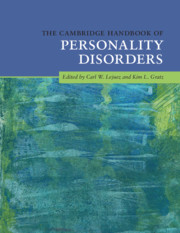Book contents
- The Cambridge Handbook of Personality Disorders
- The Cambridge Handbook of Personality Disorders
- Copyright page
- Contents
- Figures
- Tables
- Contributors
- Preface
- Part I Etiology
- Part II Models
- Part III Individual Disorders and Clusters
- Part IV Assessment
- 14 Methods and Current Issues in Dimensional Assessments of Personality Pathology
- 14a The Clinical Utility and Applications of Dimensional Assessments of Personality Pathology: Commentary on Methods and Current Issues in Dimensional Assessments of Personality Pathology
- 14b New and Continuing Developments in the Assessment of Personality Disorders: Commentary on Methods and Current Issues in Dimensional Assessments of Personality Pathology
- 14c The Importance of Multiple Sources, Longitudinal Assessment, and Clinical Utility: Author Rejoinder to Commentaries on Methods and Current Issues in Dimensional Assessments of Personality Pathology
- 15 Categorical Assessment of Personality Disorders: Considerations of Reliability and Validity
- 15a Categories, Constructs, and the Assessment of Personality Pathology: Commentary on Categorical Assessment of Personality Disorders
- 15b The Need for a More Rigorous Approach to Diagnostic Reliability: Commentary on Categorical Assessment of Personality Disorders
- 15c Balancing Hopeful and Pessimistic Views of the Future of Categorical Assessment: Author Rejoinder to Commentaries on Categorical Assessment of Personality Disorders
- 16 Assessment of Mechanisms in Personality Disorders
- 16a Parts, Wholes, and Explanations of Personality and Its Pathologies: Commentary on Assessment of Mechanisms in Personality Disorders
- 16b Genetic and Environmental Mechanisms in BPD over the Lifespan: Commentary on Assessment of Mechanisms in Personality Disorders
- 16c Complexity and Transactions: Author Rejoinder to Commentaries on Assessment of Mechanisms in Personality Disorders
- Part V Treatment
- Index
- References
16a - Parts, Wholes, and Explanations of Personality and Its Pathologies: Commentary on Assessment of Mechanisms in Personality Disorders
from Part IV - Assessment
Published online by Cambridge University Press: 24 February 2020
- The Cambridge Handbook of Personality Disorders
- The Cambridge Handbook of Personality Disorders
- Copyright page
- Contents
- Figures
- Tables
- Contributors
- Preface
- Part I Etiology
- Part II Models
- Part III Individual Disorders and Clusters
- Part IV Assessment
- 14 Methods and Current Issues in Dimensional Assessments of Personality Pathology
- 14a The Clinical Utility and Applications of Dimensional Assessments of Personality Pathology: Commentary on Methods and Current Issues in Dimensional Assessments of Personality Pathology
- 14b New and Continuing Developments in the Assessment of Personality Disorders: Commentary on Methods and Current Issues in Dimensional Assessments of Personality Pathology
- 14c The Importance of Multiple Sources, Longitudinal Assessment, and Clinical Utility: Author Rejoinder to Commentaries on Methods and Current Issues in Dimensional Assessments of Personality Pathology
- 15 Categorical Assessment of Personality Disorders: Considerations of Reliability and Validity
- 15a Categories, Constructs, and the Assessment of Personality Pathology: Commentary on Categorical Assessment of Personality Disorders
- 15b The Need for a More Rigorous Approach to Diagnostic Reliability: Commentary on Categorical Assessment of Personality Disorders
- 15c Balancing Hopeful and Pessimistic Views of the Future of Categorical Assessment: Author Rejoinder to Commentaries on Categorical Assessment of Personality Disorders
- 16 Assessment of Mechanisms in Personality Disorders
- 16a Parts, Wholes, and Explanations of Personality and Its Pathologies: Commentary on Assessment of Mechanisms in Personality Disorders
- 16b Genetic and Environmental Mechanisms in BPD over the Lifespan: Commentary on Assessment of Mechanisms in Personality Disorders
- 16c Complexity and Transactions: Author Rejoinder to Commentaries on Assessment of Mechanisms in Personality Disorders
- Part V Treatment
- Index
- References
Summary
Mechanistic explanations of personality functioning span a broad range, as is evidenced in the thoughtful commentary provided by Crowell et al. Mechanistic explanations of behavior and experience are complicated, however, by vague boundaries between potential causes and effects, across different levels of analysis as well as within the same level. This vagueness creates challenges in developing theories of how factors at lower levels of analysis are related to those at higher levels of analysis, as well as in disentangling causes and effects in general. Personality pathology is further complicated by relatively rare or even unique psychological and behavioral patterns of interest, and the long timescales over which development occurs. These challenges are important targets for future research on mechanistic explanations of personality.
- Type
- Chapter
- Information
- The Cambridge Handbook of Personality Disorders , pp. 389 - 391Publisher: Cambridge University PressPrint publication year: 2020



